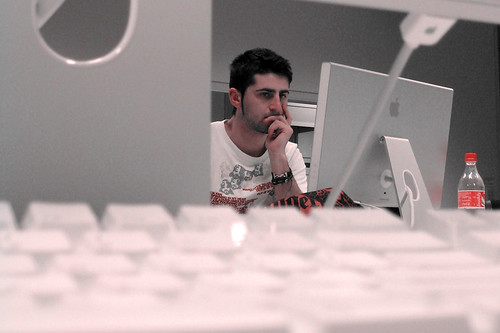
Wednesday in the 1st Week of Ordinary Time (II)
Input-Output
Readings: 1 Samuel 3:1-10, 19-20; Psalm 40:2 and 5, 7-8a, 8b-9, 10; Mark 1:29-39
There’s something I had to learn back in the days when computer programs, and computers in general, were far less user friendly. Whenever I had problems getting the machine to do what I wanted it to do, I often jumped to the conclusion that there was something wrong with either the software or the hardware or both. That was until someone reminded me that computers are built in such a way that what you get out of them depends in large measure on what you put in. As such the first thing to do when faced with a problem is to consider what you might be doing wrong. Output varies with input.
I recently had an experience of the truth of this principle while on vacation. I was enjoying some quiet time reading, when the tranquil surroundings were shattered by the sudden arrival of a group of children. They started playing near me and shouting at the top of their lungs. Two of the grown-ups in attendance looked at me apologetically and said – rather redundantly, I thought – that the children were making too much noise. A little later, however, I noticed that those same adults spoke to one another at a volume that wasn’t much lower than that of the children. A classic case of output varying with input?
Indeed, the principle of considering both input and output is so basic that we enshrine it in our approach to education. Traditionally, for example, didn’t we use to speak of acquiring the three R’s: Reading, wRiting, and aRithmetic? The first R is focused on input, the second on output, and the third on both.
And, if our readings today are anything to go by, the same basic principle holds true in spiritual formation as well. Consider how the output of the various personalities in both readings is determined by a prior input: Simon’s mother-in-law waits on Jesus and his disciples, but only after he first heals her of her illness. Jesus goes from town to town, entering their synagogues, preaching and driving out demons throughout the whole of Galilee, but only after having spent time praying in a deserted place. Samuel becomes an accredited prophet of the Lord in all of Israel from Dan to Beersheba, but only after he has learnt from Eli the art of hearing God’s voice – speak Lord, for your servant is listening. In contrast, the demons driven out by Jesus are not permitted to speak, presumably because their purposes run counter to the Lord’s God-given mission. They are not allowed any output because they receive no input from God.
If all this is true, then it might be helpful to reflect a little on our approach to fostering spiritual growth – both our own and that of those entrusted to our care. More likely than not, there will already be some emphasis on morality, on learning what are the proper things to think and say and do, as well as on what should be avoided. But, important as it is to focus, in this way, on output, isn’t it as important, if not more so, to consider how we are also learning to receive input from God? Amidst a cacophony of the many different sounds – internal and external – to which we are all exposed on a daily basis, how are we learning and helping others to learn the crucial art of recognizing and heeding the voice of God?
How balanced is our approach to input and output?
I find immediate connection with Fr Chris' reflections today, being an IT person :)
ReplyDeleteThe input-output (IO) paradigm is universal. It applies to technology, banking, the economy, even socio-religious systems. Indeed as Fr Chris put it so poignantly, the quality of our output as baptized Christians depends very much on the inputs we receive from God (namely, through others, events in our lives, Scriptures and institutional Church). I would just like to offer two other reflections on IO.
1. What you reap is what you sow. This truism is often directed at miscreants (as a veiled warning) but it holds equally true for virtuous acts, except that in the latter case, the outcome (output) can vary for the same input. A good deed can beget another, sometimes with a multiplier effect; or it can be taken advantage of or abused. Given such uncertainty, some may baulk at doing good. Would you?
2. Scientists tell us of the universal law of "balance" - of mass, of energy, of the eco-system. Jesus, Lord of science and the universe, tells us more: "What you give (i.e. generosity) will be repaid a hundred fold, pressed down and shaken over (or something to that effect). Jesus has re-cast IO to challenge even His most stalwart followers.